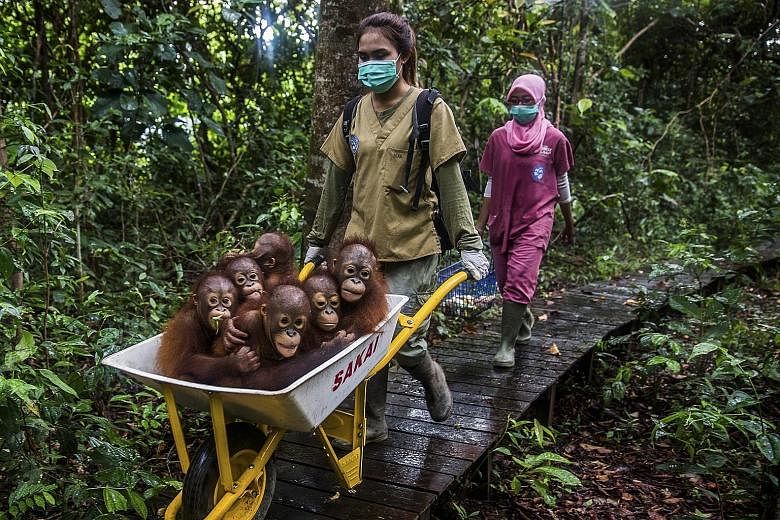NEW YORK • In early 2015, scientists monitoring satellite images at Global Forest Watch raised the alarm about the destruction of rainforests in Indonesia.
Environmental groups raced to the scene in West Kalimantan province, on the island of Borneo, to find a charred wasteland.
"There was pretty much no forest left," said Dr Karmele Llano Sanchez, director of the nonprofit International Animal Rescue's orang-utan rescue group, which set out to save the endangered primates. "All the forest had burned."
Fingers pointed to the Rajawali Group, a sprawling local conglomerate. But less known is how some of the world's largest banks have helped Rajawali - and other global agricultural powerhouses - expand their plantation empires.
The year before the clearing of trees in West Kalimantan, Rajawali's plantation arm secured US$235 million (S$334 million) in loans - funds that the Indonesian company used to buy out a partner and bolster its landholdings - from banks including Credit Suisse and Bank of America, according to an examination of lending data by The New York Times.
The deal forms part of at least US$43 billion in loans and underwriting to companies linked to deforestation and forest burning in South-east Asia alone, according to a tally compiled by the California-based Rainforest Action Network, the Dutch consultancy Profundo and the Indonesian nongovernmental organisation TuK Indonesia.
More than a third of that sum comes from American, European and Japanese banks, many of which have sustainability pledges that specifically mention deforestation.
That figure is almost certainly incomplete because not all financing is made public. It also excludes loans made by the same banks to forestry projects outside South-east Asia, or financing provided to other, more global players.
And it contrasts with efforts by companies like Nestle and Procter & Gamble to distance themselves from suppliers linked to deforestation.
The funds are aiding a process that scientists say destroys ecosystems, displaces indigenous communities and covers South-east Asia each year in a thick, suffocating smog.
"Destroying the world's forests makes fighting climate change almost impossible," said Mr Andrew Mitchell, executive director of the Global Canopy Programme, a forestry think-tank. "The finance sector is really lagging behind in realising that."
Mr Sebastian Sharp, a spokesman for Rajawali's plantation arm, acknowledged that the burning and clearing on its West Kalimantan forest sites might be illegal, but blamed it on local communities encroaching on its properties and starting the fires. He said the company did not engage in illegal burning or clearing.
Credit Suisse declined to comment. A Bank of America spokesman, Mr Bill Halldin, said the most serious accusations against Rajawali came after the 2014 loan, in which the bank played "a very small role".
Mr Tom Picken of the Rainforest Action Network said: "The allocation of finance is so influential in our economy and to our environment... But there's little way we can hold financial sectors to account."
In September, Rajawali's plantation arm secured a US$192 million loan from Bank Negara Indonesia, a state bank, to refinance the debt held by its plantation and to double the capacity of palm oil refineries in Papua and West Kalimantan.
Bank Negara Indonesia's sustainability policies say that its clients must adopt "minimum environmental, social and governance standards".
The bank did not respond to requests for comment.
NYTIMES

